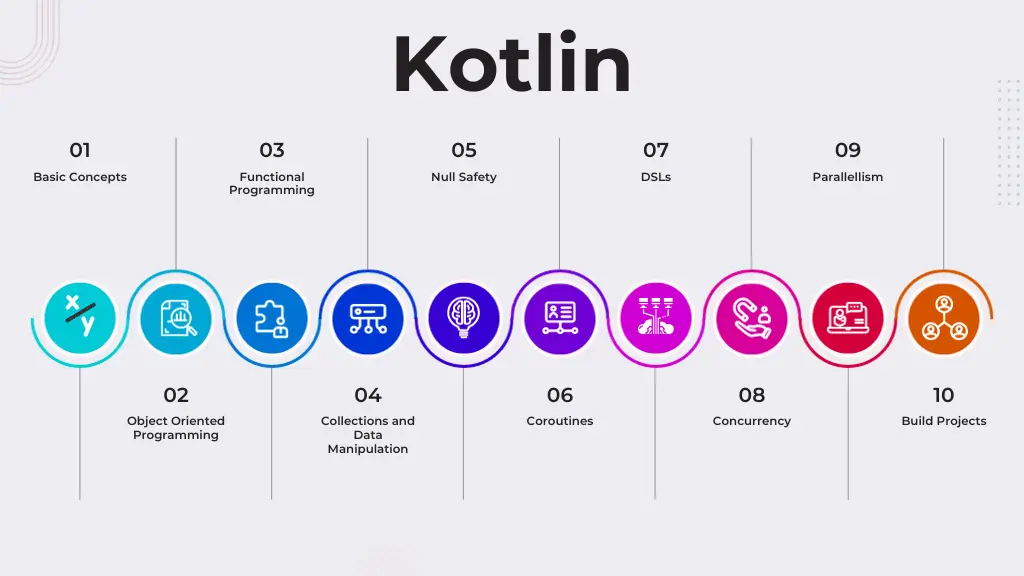Kotlin has emerged as a powerful and versatile programming language in recent years. With its concise syntax, strong type system, and seamless interoperability with Java, Kotlin has gained popularity among developers worldwide. Whether you’re a beginner looking to learn your first programming language or an experienced developer seeking to expand your skill set, mastering Kotlin can be a rewarding journey.
It was developed by JetBrains, the company behind popular IDEs such as IntelliJ IDEA and PyCharm. Kotlin is designed to be interoperable with Java, meaning that you can use existing Java libraries and frameworks in your Kotlin code, and vice versa. Kotlin also supports native compilation, which allows you to run your code on platforms such as iOS, Android, Windows, Linux and Mac OS.
Why Learn Kotlin?
- Concise and Readable Code: Kotlin offers a clean and expressive syntax that reduces boilerplate code. With features like type inference, extension functions, and smart casts, Kotlin allows you to write more concise and readable code compared to Java.
- Interoperability with Java: Kotlin is fully interoperable with Java, which means you can seamlessly use Kotlin code in existing Java projects and vice versa. This makes Kotlin an excellent choice for Android app development and maintaining legacy Java codebases.
- Null Safety: Kotlin’s type system includes null safety features that help eliminate null pointer exceptions, a common source of bugs in many programming languages. Kotlin enforces nullable and non-nullable types, encourages safe call operators, and provides the Elvis operator to handle nullability effectively.
- Functional Programming Support: Kotlin embraces functional programming concepts and provides powerful features like higher-order functions, lambda expressions, and immutability. This allows you to write clean and concise code that is easier to reason about and test.
- Coroutines and Asynchronous Programming: Kotlin has built-in support for coroutines, making asynchronous programming more straightforward and efficient. Coroutines provide a structured and sequential approach to handling concurrency, simplifying complex asynchronous code and improving performance.
- Android Development: Kotlin has become the preferred language for Android app development. Google officially supports Kotlin, and many Android frameworks and libraries have Kotlin-friendly APIs. By learning Kotlin, you open the doors to building robust and modern Android applications.
Learning Roadmap
- Basic Programming Concepts
- Variables and Data Types
- Control Flow (if-else, loops, etc.)
- Functions and Lambdas
- Packages and Imports
- Object-Oriented Programming (OOP)
- Classes and Objects
- Inheritance and Polymorphism
- Interfaces and Abstract Classes
- Visibility Modifiers (public, private, etc.)
- Functional Programming
- Higher-Order Functions
- Lambda Expressions
- Immutable Data and Immutability
- Function Composition and Currying
- Collections and Data Manipulation
- Lists, Sets, and Maps
- Collection Operations (filter, map, reduce, etc.)
- Immutable Collections
- Kotlin Standard Library Functions (let, apply, with, etc.)
- Null Safety
- Nullable and Non-Nullable Types
- Safe Calls and the Elvis Operator
- The !! Operator and Late Initialization
- Type Aliases and Type Checks
- Coroutines and Asynchronous Programming
- Introduction to Coroutines
- Coroutine Builders and Contexts
- Suspending Functions
- Asynchronous Data Flow with Channels
- Extensions and DSLs
- Extension Functions and Properties
- Extension Functions for Standard Library Types
- Creating DSLs with Kotlin
- Type-Safe Builders
- Concurrency and Parallelism
- Threads and Concurrency Basics
- Synchronization and Locks
- Thread-Safe Data Structures
- Parallel Programming with Coroutines
- Android Development with Kotlin
- Setting up Android Studio for Kotlin
- Kotlin Android Extensions
- Working with Activities and Fragments
- Using Kotlin with Android Architecture Components
- Advanced Topics
- Reflection and Metaprogramming
- Type-Safe Builders and DSLs
- Kotlin Native and Multiplatform Development
- Interoperability with Java and other languages
- Practice and Build Projects
- Small Project: Building a Command-Line Application
- Intermediate Project: Developing a Web API with Ktor
- Advanced Project: Building a Full-Stack Kotlin Application
- Explore Frameworks and Libraries
- Ktor: Building Web Applications
- Spring Boot with Kotlin: Creating RESTful APIs
- Exposed: Database Operations in Kotlin
- Testing Frameworks: JUnit, Mockito, and Spek
Note: This roadmap is a flexible guide, and you can adjust it based on your preferences and goals.
Happy Composing 🙂

One thought on “Kotlin Roadmap 2023”